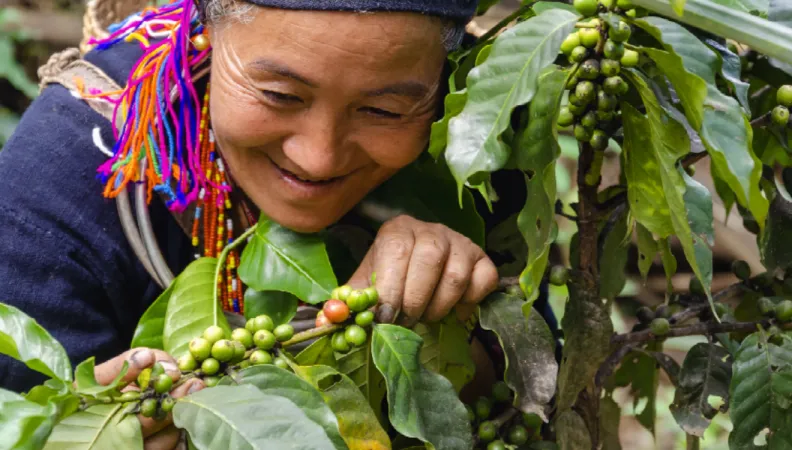Share the page
Laos: Increasingly Sustainable Coffee Production
Published on

In northern Laos, coffee growing combines respect for the environment with decent incomes for farmers. It is a relationship that has evolved in part thanks to programs supported by Agence Française de Développement.
A vast patchwork of landscapes and precious natural resources, the uplands of Laos are a veritable life source for local communities. For many years though, cultivators used slash-and-burn techniques to clear the land.
Making coffee production more sustainable models
Increasing population density, the creation of road networks and the application of the principles of the Green Revolution have had major consequences on the environment, from land erosion and a loss of soil fertility, to biodiversity loss and the pollution of water resources, which have limited or even reduced yields.
Things began to change with changing coffee-growing practices. Introduced in Laos in the 1920s, coffee has become one of the country’s three main agricultural exports, and has helped reduce poverty. With production standards that respect the environment, the sector can better protect and manage natural resources. That’s why AFD supports the creation of producers’ groups and provides them with technical assistance.
Improved conditions for coffee producers
Funded by AFD and implemented by the Ministry of Agriculture and Forestry of Laos (MAF), the Reinforcement and Expansion of the Coffee Sector in Laos (RECoSeL) project follows on from the action France has been taking to support the coffee sector in Laos for more than 20 years. RECoSeL has launched 21 sub-projects in eight provinces with support from local operators (including State agricultural services, companies, non-governmental organizations, farmers’ groups). The objectives are to introduce, improve or develop organic Arabica coffee production under forest cover, help farmers organize coffee processing and collective sales, and build partnerships with buyers. Farmers in the north of the country have benefited from price increases as a result of the stronger connections with coffee roasters and local cafés.
Fair trade models have also been tested in several companies. For example, Le Café Mueang Xieng has pledged to contribute to professionalizing producers’ groups and social development activities in villages. It has also accepted to pay higher prices. This model is called CUP (Coffee from Uplands Partnership Principles) and could be deployed in other regions so that it can serve as a reference for a future responsible commercial development in the north. The uniqueness of its flavor means it has the potential to be further developed. With international certifications farmers will be able to target niche markets abroad.
AFD has been supporting the coffee sector in Laos since 1998 through several projects based on research, the development of farmers’ organizations and the implementation of sectoral policies.
A series of initiatives have helped coffee-growers for decades
- The Bolaven Plateau Rural Development Project (PDRPB), between 1998 and 2002, has improved cultivation techniques for Arabica and promoted wet processing, a post-harvest method that improves the quality of the coffee.
- The Bolaven Capitalization-Application Point Program (PCADR-PAB) led to the creation of the Bolaven Plateau Association of Coffee Producer Groups (AGPC) in 2007 gathering 53 coffee groups. This initiative has contributed to the creation of the Coffee Board (CNCL), the installation of a coffee processing unit for green coffee beans and the preparation of organic and fair trade certifications for AGPC members.
- The Trade Capacity Building Project for the coffee value chain on the Bolaven Plateau (PRCC 2), between 2010 and 2015, contributed to restructuring the AGPC into the Coffee Producers Cooperative (CPC) in 2014. In 2010, the creation of the CNCL was made official by a decision of the Prime Minister. The Lao Coffee Development Strategy (LCDS 2025) was developed four years later
- The project for the Reinforcement and Expansion of the Coffee Sector in Laos (RECoSeL), from 2017 to 2021, is continuing to strengthen the coffee sector in Laos. The objective is to help it progress towards quality coffee recognized on regional and international markets. The project is also supporting the development of coffee in the north of the country through an approach based on the production of quality coffee that respects the environment and fair trade practices.
- On 16 June 2021, a €3 million grant was allocated from the resources of the Trade Capacity Building Program (PRCC 6) to finance the North Laos Coffee Trade Capacity Building Program (PRCC North Coffee). This additional project aims to sustain French support to the coffee sector in Laos.
